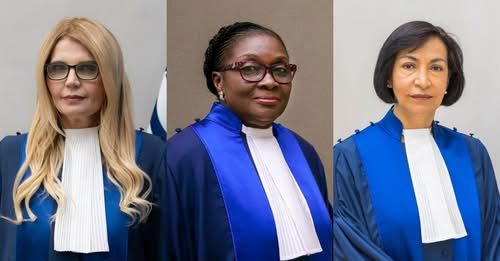
Rodrigo Duterte was arrested on March 11 for alleged crimes against humanity during his term as president and Davao City mayor. It was three women judges from the International Criminal Court who signed the warrant: Judge Iulia Motoc (who’s also the presiding judge), Judge Reine Alapini-Gansou, and Judge Socorro Flores Liera.
The warrant, obtained by The Philippine STAR, stated that Duterte was arrested for murder, torture, and rape—which are part of the 15 forms of crimes against humanity under the Rome Statute—that happened in his bloody war on drugs.
Upon assuming office in 2016, the Duterte administration launched Oplan Tokhang, which saw the execution of thousands of suspected drug peddlers, users, and small-time criminals.
Based on the government’s “Real Numbers” data, a total of 6,229 individuals were killed during anti-drug operations from July 1, 2016, to Jan. 31, 2022. Rights groups, however, estimated that the number of deaths from the bloody anti-narcotics campaign reached as high as 27,000.
Here’s what you need to know about the three judges who signed Duterte’s ICC warrant.
Rodrigo Duterte was arrested on March 11 for alleged crimes against humanity during his term as president and Davao City mayor. It was three women judges from the International Criminal Court who signed the warrant: Judge Iulia Motoc (who’s also the presiding judge), Judge Reine Alapini-Gansou, and Judge Socorro Flores Liera.
The warrant, obtained by The Philippine STAR, stated that Duterte was arrested for murder, torture, and rape—which are part of the 15 forms of crimes against humanity under the Rome Statute—that happened in his bloody war on drugs.
Upon assuming office in 2016, the Duterte administration launched Oplan Tokhang, which saw the execution of thousands of suspected drug peddlers, users, and small-time criminals.
Based on the government’s “Real Numbers” data, a total of 6,229 individuals were killed during anti-drug operations from July 1, 2016, to Jan. 31, 2022. Rights groups, however, estimated that the number of deaths from the bloody anti-narcotics campaign reached as high as 27,000.
Here’s what you need to know about the three judges who signed Duterte’s ICC warrant.Related ArticleTIMELINE: From Duterte’s 2016 war on drugs to his March 2025 arrest
Judge Iulia Motoc

Motoc, who hails from Romania, joined the ICC in 2024.
Before that, she was a judge at the European Court of Human Rights from 2013 to 2023 and Constitutional Court of Romania from 2010 to 2013.
As judge, she dealt with serious and complex cases, including corruption and sexual violence, genocide, crimes against humanity, and war crimes.
Motoc served as a UN Special Rapporteur for the Democratic of Congo, reporting crimes against humanity and war crimes. She’s also a member of the Institut de Droit International.
She has extensive work with the UN. She was a member and vice president of the UN Human Rights Committee, which examines the right to life, enforced disappearances, and other massive violations of human rights. She was also a member and president of the UN Sub-Commission on Promotion and Protection of Human Rights.
She co-drafted the UN report on free, prior, and informed consent of indigenous people and the UN Guidelines on extreme poverty. She was also UN Special Rapporteur on Genetics and Human Rights.
In Europe, Motoc was a member of the Advisory Committee on the Framework Convention for the Protection of National Minorities and European Union Agency for Fundamental Rights, and of the Management Board.
She started teaching at the University of Bucharest in 1995 and became full Professor in 2002. Her research interests include force, theory of international law, human rights, and transitional justice. She has been a visiting professor at various institutions, including the European Institute Florence, University Paris I, and Academy of International Law, The Hague, European Inter-University Centre for Human Rights and Democratization in Venice.
Motoc has a law degree from the University of Bucharest (1989), and a master’s degree (1991) and doctorate in international law (1996) from the University Paul Cezanne, Aix-Marseille III. She got her second doctorate, in philosophy, from the University of Bucharest (1999). A year before that, she obtained the habilitation in law from Paris XI, Jean Monnet (1998).
She was a senior fellow at the New York University School of Law from 2003 to 2004 and Yale School of Law from 2004 to 2007. She was also a professor of international law.
Motoc authored more than 80 publications.
Judge Reine Alapini-Gansou

Gansou, who hails from Benin, joined the ICC in 2018.
She spent 12 years at the African Commission on Human and Peoples’ Rights as commission chair from 2009 to 2012. She was also Special Rapporteur on the situation of human rights defenders in Africa from 2005 to 2009, and from 2012 to 2017.
She has been a member of several UN commissions of inquiries on human rights violations and chaired the joint working group on special procedures of the UN and the ACHPR.
In 2011, she was appointed as judge at the Permanent Court of Arbitration.
Gansou has been a professor at the University of Abomey-Calavi in Benin.
She has a joint postgraduate degree from the Universities of Maastricht (Netherlands), Lomé (Togo), and Bhutan. She also has a university degree in common law from the University of Lyon 3 (France). She also obtained a master’s degree in business law and judicial careers from the National University of Benin.
Gansou has several diplomas in international human rights law at the African Institute of Human Rights in Banjul, René Cassin Institute of Human Rights in Strasbourg in France, and the International Development Law Organization in Rome. She admitted to the Benin Bar in 1986 and worked for the Association Avocats Sans Frontières Belgium on the project “Justice for all in Rwanda” in 2001.
She is also a member of the International Criminal Bar.
Judge Socorro Flores Liera

Liera, who hails from Mexico, joined the ICC in 2021.
She has had a distinguished career in Mexico’s Foreign Service, holding a number of senior posts, most recently the Permanent Representative of Mexico to the Office of the United Nations and other Geneva-based international organizations.
She also served as vice president of the Human Rights Council in 2020.
As a member of the Mexican delegation, Liera was closely involved in the process leading to the ICC’s inception since 1995.
She had work involving the negotiations that led to the Rome Statute and to the adoption of the Elements of Crimes and Rules of Procedure and Evidence.
Afterward, she served as the first head of the court’s Liaison Office at the United Nations in New York.
Liera served as advocate-counselor of Mexico in proceedings brought before the International Court of Justice in the “Avena” case (Mexico v. United States).
She has participated in the negotiation of several international instruments in the field of public international law, and served as chairperson of the Drafting Committee at the 33rd International Conference of the Red Cross and Red Crescent.
Liera studied law at the Universidad Iberoamericana and the Faculty of Law of the Universidad Nacional Autónoma de México, specializing in public international law.
Her publications covered areas like international criminal law, international cooperation, and climate change.
She is a member of the Mexican Branch of the International Law Association.


